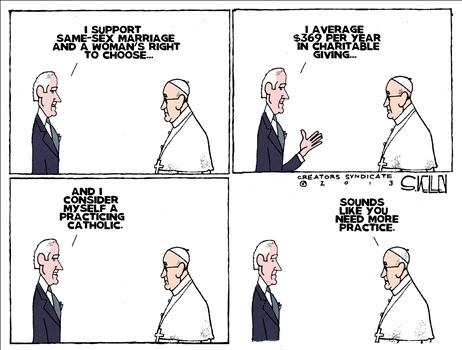Joe Biden and Nancy Pelosi will be present today in Rome for the celebratory mass to be held by the new pope, Francis I. They were chosen as part of the delegation because they are Catholic. Never mind that their beliefs are anything but Catholic. Both favor the pro-abortion stance and have come out in support of same-sex marriage. What I wouldn’t give to see the following scenario unfold:
Biden and Pelosi, like too many of their fellow Catholics, are Catholic in name only. It’s a cultural thing, brought up in the church believing that since they have more or less followed the outward rules and they go through the motions of religion, that they are accepted in the sight of God. Forgive the old cliché, but I must repeat: going to church makes one a Christian no more than going into a garage makes one a car.
We see the same thing in the Protestant world. The mainline denominations have pretty much abandoned Biblical truth. They maintain the name of Christian, but their doctrines have consistently strayed from orthodoxy. Being a Methodist, for instance, back in the early nineteenth century, meant you were a serious disciple of Christ. Now such denominational labels are worthless. They’re like Forrest Gump’s box of chocolates: you never know what you’re going to get when you enter a mainline Protestant church.
Evangelicals are supposed to be the torchbearers for scriptural fidelity, but modern evangelicalism has often succumbed to the latest trendiness, both theologically and culturally. Send your child to what you think is a conservative, evangelical college or university, and you may be surprised by the return on your money. All too frequently they are taught to question the authority of Scripture. Now, I believe in testing all things and I understand we are to lead students into critical thinking rather than simple indoctrination, but that should be carried out with a dependence on God’s leading and a basic trust in the integrity of His communications with man. There remains a framework within which we explore. The so-called “open mind” of secular education is often so open it accepts anything—similar to a sewer.
Some of our evangelicals are being lured by the siren song of social acceptability as basic Biblical beliefs are junked. Take the trendy author/pastor Rob Bell as an example. Last year he wrote a book that subtly, yet clearly, denied the doctrine of hell. Now we learn he believes in same-sex marriage. How many young people will he lead into a spiritual abyss, all in the name of the love of God?
I’m reminded of a passage in the book of 2 Timothy, as the apostle Paul writes about the characteristics of individuals who are to be shunned, noting they will be “holding to a form of godliness, although they have denied its power.” He then instructs Timothy to “avoid such men as these.”
Why avoid? I’m not just talking about theological differences here; it goes much deeper. Outward forms of godliness are powerless against sin. Only through the genuine gospel message will a person be set free from the bondage of sin. When we water down that message—removing a thorough understanding of the absolute destructiveness of sin—no one is set free. Any gospel that omits teaching about sin and the necessity of heartfelt repentance is a false gospel that leaves people lost in their sins.
I am grieved by the prevalence of superficial spirituality. I am disturbed by those who have little concern for eradicating sin, both in ourselves and in society at large. Outward forms will never suffice. We must truly become new creations in Christ.

